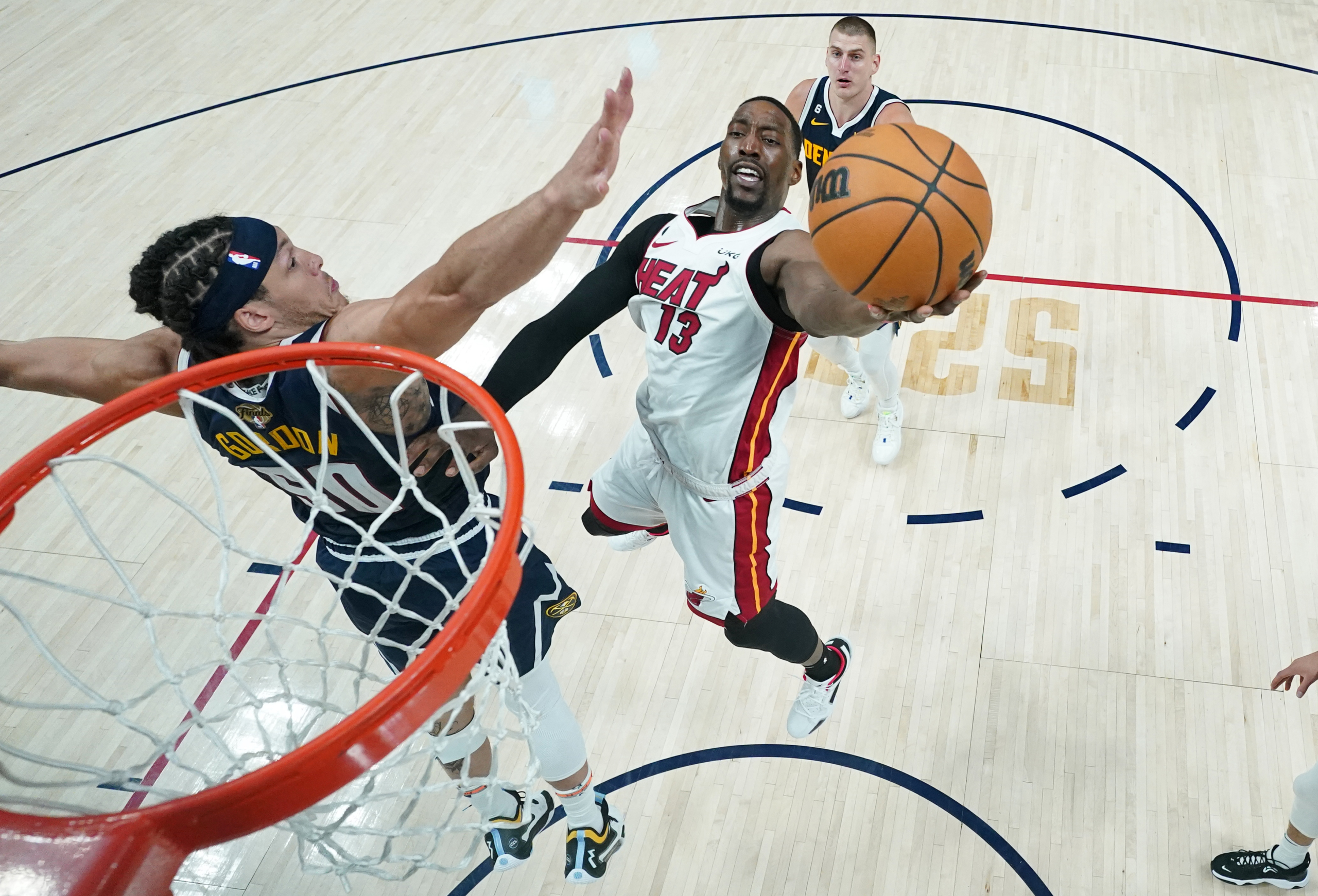On paper, the Miami Heat should have no shot at winning the NBA championship. As the Heat have proven throughout this past year, though, how a team looks on paper does not always match up with reality.
So why should anyone be surprised that the Heat escaped with a 111-108 win over the Denver Nuggets on Sunday in Game 2 of the NBA Finals? Just because the Nuggets appeared overwhelmingly dominant in their Game 1 win?
Granted, I still believe Denver will win the NBA championship even after Miami followed the old-adage with turning a playoff matchup into an actual series by stealing a road game. The Nuggets are fully healthy. They have tons of offensive and defensive depth. And they usually respond well after losses.
But the Nuggets aren’t going to collect the Larry O’Brien trophy by waltzing their way through games. They will have to compete, make constant adjustments and absorb the physicality that the Heat throw their way. After all, that explains how Miami became only the second eighth seed in NBA history to advance to the Finals in the first place.
Miami overcame a turbulent regular-season and a play-in tournament loss to Atlanta by grinding against an underwhelming Chicago team. Miami took advantage of a Milwaukee team that struggled to flex its depth and continuity without Giannis Antetokounmpo for half of the first-round series. Miami beat an overachieving New York team in the second round by beating them at their own game on hustle plays. Miami survived a seven-game Eastern Conference Finals against Boston by exploiting its inconsistent chemistry, effort and coaching in three consecutive wins. Miami then absorbed Boston’s counterpunch after it finally played to its full potential.
Against Denver? In Game 1, the Miami Heat appeared overwhelmed with limiting the Nuggets’ offensive depth while struggling to tap into theirs. Miami responded by simply making the needed adjustments both in tactics and execution.
Miami Heat finds scoring touch
While Gabe Vincent (23 points), Bam Adebayo (21) and Jimmy Butler (21) maintained their usual consistency, Max Strus and Duncan Robinson gave Miami the additional outside shooting they lacked in Game 1. Strus scored 14 points on a 4-for-10 mark from 3-point range after shooting terribly in Game 1 (0 points on 0-for-10 shooting). Robinson added 10 points while going 4-for-5 overall and 2-for-3 from deep after struggling to hit anything in Game 1 (three points on 1-for-6 from field; 1-for-5 from 3).
The Miami Heat considered these developments inevitable considering their track record. Robinson and Strus deserved credit, however, for staying confident and aggressive. Their teammates deserved credit, though, for spacing the floor and passing them the ball for open looks. The Heat also enhanced their offensive balance by attacking the basket more than they did in Game 1. That resulted in the Heat attempting more free-throws in Game 2 (18-for-20) than in Game 1 (0-for-2). That approach also aided the team’s floor balance, which in turn helped its outside shooting.
It seemed reasonable to expect the Heat could make those low-hanging fruit adjustment. But with stopping the Nuggets’ loaded offense? That seemed almost impossible. Even if the Heat competed and defended physically without fouling, Denver simply has every positional need filled with a talented and versatile center (Nikola Jokic), an aggressive scorer and playmaker (Jamal Murray), a front-court hustle player (Aaron Gordon) and three talented wings (Michael Porter Jr., Kentavious Caldwell-Pope, Bruce Brown).
The Miami Heat pulled it off, though. Miami coach Erik Spoelstra dismissed the suggestion that Miami “wanted” Jokic to score 41 points so long as he only collected four assists. After all, the Heat defended Jokic with physicality. They threw multiple bodies at Jokic, including Kevin Love, Adebayo and Butler, in hopes to wear him down. Nonetheless, the Heat calculated with their actions that Jokic’s scoring presents a more acceptable outcome than allowing the rest of the Nuggets’ offense to fully flourish. Murray (18 points), Gordon (12), Brown (11), Caldwell-Pope (six) and Porter (five) likely would have scored more had the Heat defended Jokic differently.
These developments caused Nuggets coach Michael Malone to question his team’s effort. After all, Miami opened both the first quarter (10-2) and fourth quarter (15-2) with significant runs. Had Butler not successfully contested Murray’s 3 that could have forced overtime, Malone believed the Nuggets may have secured a game in overtime that they didn’t fully deserve to win.
In fairness to the Nuggets, though, it appeared they competed and tried to play with the right approach. They didn’t fully account, however, for the likelihood that the Miami Heat would play Game 2 with the kind of urgency usually reserved for potential elimination games.
Maybe that prompts Denver to raise its energy level in Game 3. The Nuggets only needed to watch Miami’s entire postseason run, however, to know it the Heat will never back down. They will do whatever it takes at least to keep the Finals competitive, if not steal it.
On paper, the Nuggets should still remain the overwhelming favorite to hoist the Larry O’Brien trophy. They will have to first navigate an exhausting week ahead. Miami will make sure of it.
Mark Medina is an NBA Insider for Sportsnaut. Follow him on Twitter and on Instagram.

